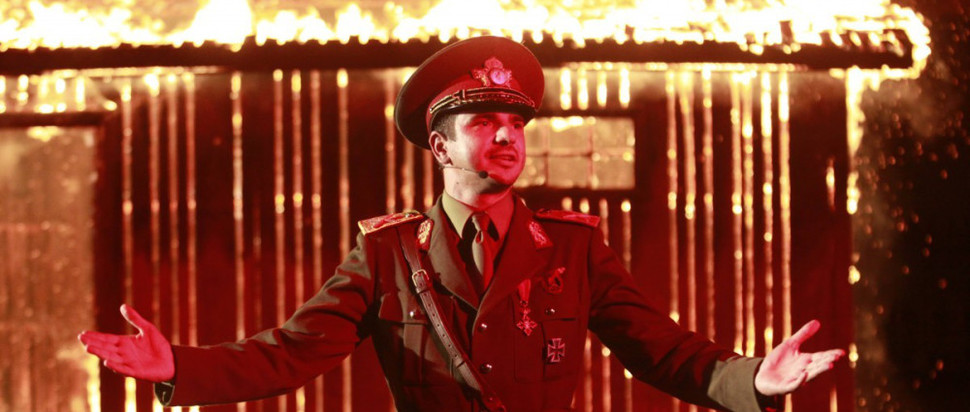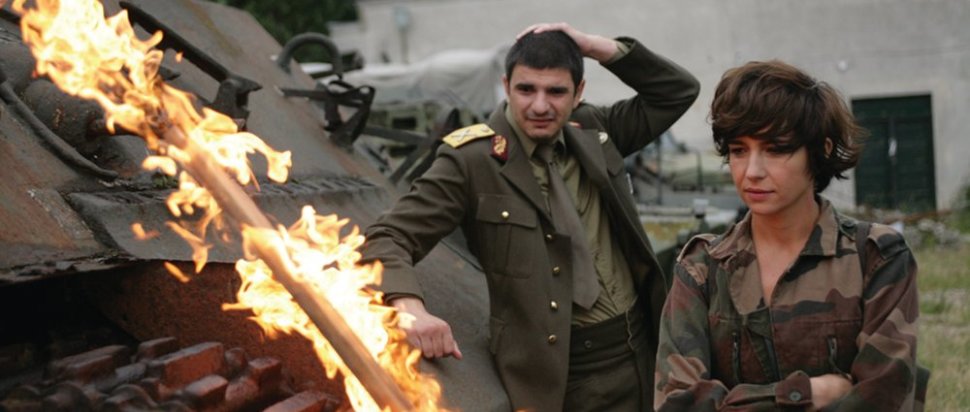Radu Jude on I Do Not Care If We Go Down in History as Barbarians
Bucharest-born filmmaker Radu Jude (Aferim!) is back on blistering form with meta-fictional satire I Do Not Care If We Go Down in History as Barbarians, following a theatre director attempting to re-stage the Odessa Massacre
One of the more inventive voices to emerge from the Romanian new wave, Radu Jude has long been a director who challenges expectations. His contemporaries like Corneliu Porumboiu, Cristi Puiu and Cristian Mungiu are better known for examining the legacy and dictatorship of Nicolae Ceaușescu; Jude’s work, however, is known to probe much deeper into the national psyche. His latest, I Do Not Care If We Go Down in History as Barbarians, does just that, borrowing its title from an infamous speech by Ion Antonescu, who sanctioned a brutal massacre on Europe’s Eastern Front during the Second World War.
The film sees Jude return to the topic of anti-semitism, a subject he’s explored in his previous three films. First, in 2015, with Aferim!, a quasi-western that follows a pair of lawmen on the hunt for a fugitive Roma. Jude returned again a year later with Scarred Hearts, a period drama based on the autobiography of Romanian author Max Blecher, in which a sanatorium for tuberculosis sufferers mirrors a society where antisemitism is becoming increasingly virulent. Following this was last year’s The Dead Nation, a documentary in which Jude juxtaposes glass-plate photos from the 1940s with the diary entries of a Jewish doctor to illustrate the chasm between personal experience and political propaganda.
Barbarians feels like the culmination of all three of these films, chronicling the difficulties of Mariana Marin (Ioana Iacob), a young theatre director attempting to stage an historically accurate re-enactment of the Odessa Massacre – in which Romanian soldiers slaughtered tens of thousands of Ukrainian Jews before switching sides to fight against Germany in 1944. Although Antonescu was later executed by a military firing squad for his wartime crimes, Romania’s history of anti-Semitism remains a prickly topic. “The Holocaust is not common knowledge in Romania, it's still deeply polemic,” explains Jude, when we sit down at the Hamburg Film Festival to discuss his latest film. “To this day it still creates huge debates. This film has upset a lot of people. Some have even called me a traitor.

“I belong to a generation that grew up with large parts of its history hidden,” he explains when asked about the abuse he's received and his fascination with this dark period of Romanian history. “I’m not really interested in history, but I went to school just after the communist dictatorship ended. What followed was a heightened period of nationalism. So when I entered my 20s, [I] discovered all these stories and artefacts that didn’t fit with the narrative I had been taught. This discovery didn’t shock me – I’m not that naïve – but I was angry. I wanted to know why I was lied to.”
This might explain why some Romanians have found Barbarians’ depiction of their country’s role in the Second World War difficult to swallow, but for Jude it was important to avoid getting caught up in the factual inaccuracies surrounding the Holocaust. “This isn’t a film about finding the truth, it’s a film about research,” he explains, before getting side-tracked when questioned about the antinomy between history and truth. “I mean... what is that word… truth? I’m not against it. I’m not a postmodernist forcing a philosophical perspective on the audience, but I believe there are different types of truth. When you talk about algebra or mathematics there’s a precise truth, but it’s not the same when you speak about history.”
Comprised of various production meetings and rehearsals in which Mariana’s quest for authenticity is met with opposition on multiple fronts, the film plays out as a series of confrontations. Actors are uncomfortable with performing a version of history they don’t recognise, while local officials insist Mariana should dilute her depiction of the atrocity. Conversations about representation, nationalism and intellectualism unfold in Jude’s typically playful style, including one particularly heated debate in which Mariana quotes Marx’s famous adage that history repeats itself, “first as tragedy, then as farce.”
She could quite easily be talking about Jude’s approach to history, as here – much like in his previous films – the uncomfortable laughter that accompanies this scene is rooted in the disturbing parallels he makes between the past and the present. “I think it was Rohmer who said that words should belong to cinema. I wanted to create a film that was one long discussion.”
From the film’s Brechtian opening, when Mariana addresses the audience directly, it’s clear that Jude wants to avoid the type of sentimental narrative that has become synonymous with Holocaust dramas, instead provoking a conversation with the viewer, even if his heavily didactic approach can feel like being trapped in a one sided argument. “I wanted to create an extended dialogue built around the questions raised when you embark on projects like this. These conversations are meant to represent society speaking. However, despite my best intentions, I still get asked the same old questions at the Q&As: ‘Why did you make a film about this?’ or ‘Why didn’t you make a film about the Romanians who were massacred by the Soviets?’ You can’t win sometimes.”
"All history is a story. You can’t escape that" – Radu Jude
Barbarians continues a recent trend of documentaries that use historical re-enactment to explore lingering trauma for cathartic effect. From Joshua Oppenheimer’s The Act of Killing, to Lola Arias’ Theatre of War, these films question if it’s ever really possible for filmmakers to balance the demand for historical accuracy with the kind of messy, unresolved truths of real life. “You can't separate history and narrative,” argues Jude. “I think it was the French historian Paul Veyne who defined history as a synthesis of past events turned into a narrative with real people. All history is a story. You can’t escape that, but for me, every film should somehow inform the viewer that what they are seeing is a form of reconstruction. Sadly, most films tend to imply that what they’re showing is the truth”
One of the most widely-accepted ideas about historical thinking is that “history is always written by the victors”. Jude doesn’t disagree with this assertion, but believes it shouldn’t shape historical narratives. “I think it's important when you look at history," he continues, "that you don’t put yourself in the position of the victim. A lot of people think I'm Jewish because my surname is Jude, but I'm not. I wanted to make a film about the Holocaust from a Romanian perspective, not from a victim's perspective. If I was Jewish I probably wouldn't have made this film. I would have made a film about Palestinians. I think when you make a film where you symbolically victimise yourself it becomes very problematic, because it creates a kind of hate speak towards somebody else. I think it’s always more modest and more important to discuss history when your position was not that of the victim.”
Jude has created a film that approaches the past with its own questions and strategies, resulting in a deeply resonant film that not only unmasks his own nation’s collective amnesia, but challenges the audience to consider the role history plays in shaping political ideologies and personal assumptions about the way the world works. “I’ve upset a lot of people with this film,” he states with a mischievous smile on his face. “But it’s worth it when people say to me this is the first they’ve heard about this incident, and that they want to know more! This is the reaction I want when I make films. It pleases me when I hear that people have gone on and discovered something new.”
I Do Not Care If We Go Down in History as Barbarians screens at Glasgow Film Festival – Tue 26 Feb, GFT, 8pm; Wed 27 Feb, GFT, 3.15pm
